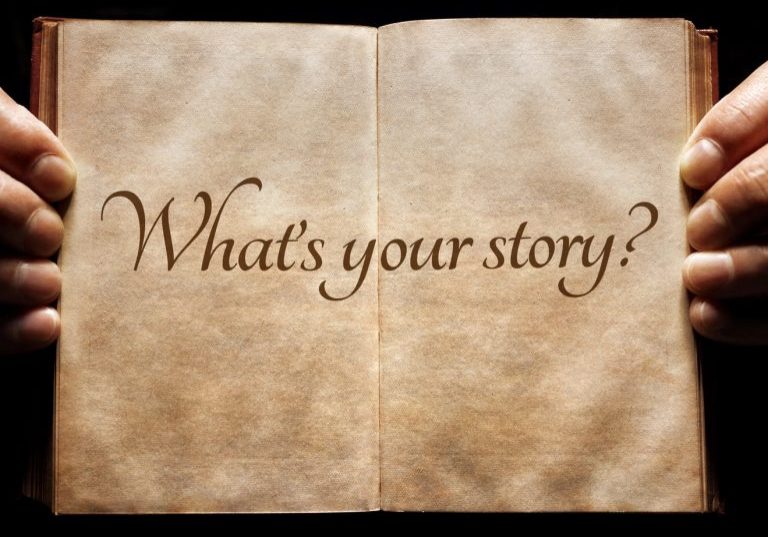Part 1: My Story Isn’t The Same As Our Story
The story of how I met my wife, Silvy, ten years ago is straight up magic. And for the first few months after we met, whenever she and I were with friends, I delighted in telling it to anyone who asked.
But after patiently enduring my enthusiastic performance more than a few times, Silvy confessed one day that she didn’t like how I was telling the story.
Not gonna lie … kinda crushed me to hear that.
I thought I was telling a beautiful story, a hopeful story, in which love triumphed despite overwhelming odds against it. I thrilled in emphasizing its improbable twists and turns, the serendipitous moments where, had I made a seemingly insignificant choice differently, fate would surely have eluded us. I believed my story honored her, exalted her even, as the sudden realization of a lifetime dream that was still a lifetime away in the very moment before our eyes met in that cafe.
Now, if you’re paying attention, you’ll notice something:
I wasn’t telling our story.
I was telling my story.
I certainly wasn’t telling Silvy’s story; nor did she feel genuinely honored in my version. She thought certain plot points I’d emphasize only served to make me look good at her expense. Naturally I didn’t see it that way (I’d never do such a thing!), so we’d argue over this for months to come.
She felt overlooked and unconsidered.
I felt misunderstood and censored.
Thus we became stuck in a common (yet rarely acknowledged) struggle many couples encounter:
We didn’t know how to hold or tell the most important story of our relationship in a way that made us both feel understood, cared for, and honored.
More recently I coached a young couple who’d gone through a painful, traumatic event in the first few months of their relationship. By the time they came to me they, too, were stuck, each living inside a different version of a painful past, unable to repair the bridge between them. Sadly, they split up before I could help them arrive at a shared story that would honor both of their experiences.
Not that it would have been easy or quick to get there.
Regardless how a relationship begins, whether by fairy tale or by fire, it’s hard enough for two people brand new to each other to meld their distinct worlds together. It’s like two planets colliding, each with their own customs, languages, even laws of physics – a chosen calamity of sorts for the sake of creating a third planet, The Planet of Us, which can only be shaped from the chaotic detritus of your two previously distinct identities just smashed to smithereens. It’s gonna be messy, potentially fiery, and unavoidably disorienting … and take a lot of time.
I often tell couples to expect it will take 10 years before they’re really good at being together – that’s from the moment they consciously decide to start actually learning how to be good together.
That doesn’t mean it will take 10 years, but it always takes far longer than anyone ever wants it to.
It took Silvy and me about 7 years to learn each other’s operating systems well enough to start navigating life together with more ease. We still stumble over each other’s stubborn childhood wounds and often opposing needs and desires. We just know better today how to quickly repair and come back into connection.
We’ve also learned how important it is that we tell our growing archive of stories in ways that are actually our stories; not just mine, or hers.
This is what shapes a relationship over time into an epic tale, as your life together gets slowly woven into a rich tapestry of interweaving events, milestones, choices, tragedies, triumphs. As your relationship unfolds countless new stories are born: some beautiful, some funny, some painful, some involving rupture and breakdown, even betrayal, and many of your stories you won’t both quite see the same way.
You’ll meet each other’s family and friends and go on trips together. You’ll wrestle with competing needs, sensitivities, ambitions, and desires. You’ll experience sickness and loss. You’ll move through countless struggles, both alone in each your own individual life challenges, and together through the thorny thickets most all couples must face.
Life will do what Life does, taking both of you along for the ride. Sure, you might be sitting side-by-side in the same roller-coaster pod, but more often than you’d like you’ll be having perplexingly different experiences of the same ride.
So on top of the years it takes to merge your two worlds in all the regular ways – practically, emotionally, mentally, spiritually – you also must learn how to hold and tell the various stories of your journey in ways that honor and incorporate both of your experiences.
Sadly, far too many people learn to tell the stories of their relational journey in unbalanced ways.
Sometimes that sounds like one partner holding themselves up as somehow wiser, more considerate, more loving, more capable, more thoughtful, more relaxed, more trustable – more of whatever characteristic they hold valuable, which they don’t see their partner similarly (sufficiently) offers.
It can also sound like a story told through the stressful frame of the victim-perpetrator dance, as one partner lives resentful inside a past reality in which the other harmed them and has yet to make sufficient amends.
Even when it’s undeniably true that their partner did something that harmed them, if a couple hasn’t yet found their way to holding that story outside of the victim-perpetrator frame, they will continue to be dragged down by the mental and emotional weight of it.
*note: In my coaching practice I often help people escape the “Drama Triangle,” in which only 3 relational stances can exist: victim, perpetrator, and savior. Learning to escape this toxic triangle is game-changing for people and couples.
Through years working with couples** I’ve found that women tend to tell stories of their men that suggest they lack emotional intelligence and sensitivity:
“I was working so hard to make a good life for us those first few years, yet he abandoned me to focus on whatever else he thought was important .. besides me.”
“I was planning our dream wedding when he had the nerve to think it would be ok to invite his ex-girlfriend.”
“He could never be gentle with our kids; I was always trying to get him to be softer.”
Men tend to tell stories of their women that suggest they lack intellectual rationality and emotional stability:
“She can’t handle the truth. Once, early in our relationship, she asked for it and so I gave it to her. She lost her frickin’ mind. I vowed not to make that mistake again.”
“Arguing with her is like arguing with a 2-year old who can’t tell reality from fantasy.”
“She’s impossible. There’s no winning with her. Nothing makes her happy.”
These are all real stories I’ve heard from couples over the years. Yes, men also tell stories of woman’s lack of emotional sensitivity and women of man’s lack of calm and rationality.
What’s vital to understand is that how you tell your stories matters.
If you tell stories about the relationship, or about each other, in ways that are laced with contempt, righteous blame, or shame. What other outcome can you possibly create but a toxic relationship filled with the same?
If you tell your stories in ways that pedestal your truth while waterboarding your partner’s truth, your relationship becomes a torturous power struggle neither of you can ever win.
♦◊♦
👉 READ PART 2 HERE … to learn why “stories” ended my relationship with my father, and why arguing over ‘facts’ never works.
p.s. If you want coaching to help you elevate your relationship stories, contact me at [email protected].
- 0shares
- 0Facebook
- 0Twitter
- 0Pinterest
- 0Email




Leave a Comment